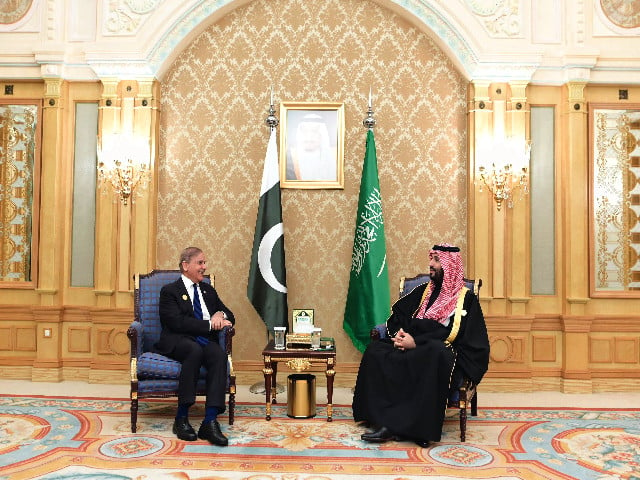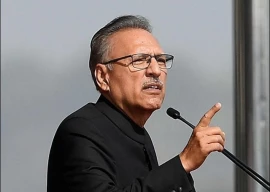
Prime Minister Shehbaz Sharif and Saudi Arabia Crown Prince Mohammed bin Salman on Tuesday stressed the need for the two countries to bring about a qualitative change in the bilateral economic, trade and investment relationship.
The prime minister met with the Saudi crown prince in Riyadh on the fringes of the One Water Summit – a joint initiative of Saudi Arabia, France, Kazakhstan, and the World Bank. This was Prime Minister Shehbaz's fifth meeting with Crown Prince Mohammed in the last six months.
"Prime Minister Muhammad Shehbaz Sharif had a warm and cordial meeting with the Saudi Crown Prince Mohammed bin Salman this evening on the sidelines of the One Water Summit," said a press release issued by the Prime Minister's Office in Islamabad.
"The Crown Prince spoke of his great pleasure at meeting the Pakistani prime minister for the fifth time over the past six months. He said that this was a testament to the genuine love and affection connecting the peoples of the two countries," the press release added.
According to the press release, the two leaders reiterated their common commitment to bring about a major transformation in the bilateral ties. "Both leaders agreed that it was now necessary for the two countries to bring about a qualitative change in their economic, trade and investment relationship."
In their talks, the crown prince stressed that it was important to ensure that Pakistan and Saudi Arabia enhanced meaningful cooperation that would bring about economic growth and prosperity in Pakistan, it added.
Both leaders expressed satisfaction at the pace of progress of the implementation of the Saudi memoranda of understanding (MoUs) and agreements regarding investment in Pakistan, it said, adding that Shehbaz thanked the crown prince for his "most genuine affection" for the people of Pakistan.
In the meeting, the prime minister reiterated his invitation to the crown prince to visit Pakistan at his earliest convenience. The crown prince responded that he was looking forward to his visit to Pakistan," the press release said.
Prime Minister Shehbaz also met French President Emmanuel Macron on the sidelines of the One Water Summit. The two leaders agreed to enhance cooperation through business-to-business contacts in the areas of agriculture, livestock, Information Technology, and clean drinking water.
According to a private TV channel, the two leaders expressed satisfaction at the positive trajectory of the bilateral relations. They exchanged views on the full spectrum of relationship, including political, economic, trade and investment, as well as cooperation at multilateral forums.
Commending France's leadership role on climate change and development issues, the prime minister recalled with appreciation President Macron's strong advocacy for the people of Pakistan in the wake of the 2022 devastating floods.
Earlier, addressing the 'One Water Summit' on the margins of United Nations Convention to Combat Desertification (UNCCD COP-16) in the Saudi capital, the prime minister proposed a six-point agenda at the global level to overcome water-related challenges.
The summit in Riyadh is a joint initiative of Saudi Arabia, France, Kazakhstan, and the World Bank. The summit under the theme "Restore, Preserve, and Adapt" aims at a coherent international approach towards water resource management through high-level political commitments.
In his address, Shehbaz praised the organisers for holding the timely summit to deliberate upon, one of humanity's most pressing challenges – water security. He said that water transcended political boundaries, connecting nations and fostering shared ecosystems.
"Pakistan, therefore, attaches great importance to trans-boundary cooperation," Shehbaz told the gathering. "The Indus Water Treaty [IWT], which governs the sharing of the Indus basin's waters, is one example of such an arrangement," he said.
He added that the treaty witnessed unprecedented challenges in recent years, due to a number of factors, including construction of upstream dams, whereas its effective functioning was the key to maintaining regional peace and stability.
Six-point agenda
The prime minister proposed a six-point agenda at the global level to overcome water-related challenges:
International cooperation and collaboration, to "ensure availability and sustainable management of water and sanitation for all", as provided for in the SDG-6;
Exchange of knowledge and expertise, as well as transfer of technologies on innovative water management on a priority;
Adequate funding for climate-resilient infrastructure, and overcoming financing gap – a critical challenge for climate vulnerable countries;
Frameworks for transparency, data sharing, and regional cooperation, to avoid conflicts, and promote water sharing;
Investment in skills development, research, and institutional strengthening, to tackle water challenges at national and global levels; and finally,
A strong political will and global leadership to overcome the water crisis.
The prime minister said that water was the lifeblood of the planet; a cornerstone of economic development, food security, and environmental sustainability. "This life-sustaining resource, however, is coming under increasing stress," he warned.
"Nearly half of the world's population is facing, water scarcity, for at least part of the year. Billions remain without clean drinking water, as water pollution is rising at alarming levels," he said. "This [situation] is not a distant threat, but an alarm bell for collective action," he added.
He told the summit that Pakistan was also no stranger to those challenges, saying that the country was still grappling with the 2022 catastrophic floods that caused widespread damage to its water resources and irrigation sector in addition to affecting millions of lives and livelihoods.
"Our rivers, glaciers and aquifers are increasingly vulnerable to the impact of climate change, and population growth," he said. "Projected temperature increases in Pakistan are significantly higher than the global average," he added.
At the same time, he said, droughts posed an equally potent threat to the country. "Nearly 70% of our land consists of arid and semi-arid areas and around 30% of our population is directly affected by drought-like conditions," he said.
Shehbaz highlighted that such catastrophic disasters and challenges were likely to scale up further in the absence of concerted international actions as it was one of the top-10 countries, most vulnerable due to climate change.
The prime minister also shed light on the 'Recharge Pakistan' initiative that aimed at addressing climate-induced flood risks and mitigating drought impacts through ecosystem-based adaptations. "We are also finalising a 'National Drought Plan' to mitigate, the impact of the drought," he said.
He commended the visionary leadership, and initiative of Saudi Arabia Crown Prince Mohammed bin Salman to establish the Global Water Organization. "We are proud to join this initiative, as one of its founding members and look forward to providing, all possible support, in achieving its important goals."
Shehbaz arrived in Riyadh on a two-day visit to represent Pakistan at the "One Water Summit". He is accompanied by Information Minister Attaullah Tarar and Special Assistant Tariq Fatemi. After landing at the airport, Shehbaz took to X, terming the summit "a timely event".
He said that the summit offered an opportunity to "deliberate upon collective strategies to tackle water security" challenges. "Together, we aim to accelerate action to combat desertification, address water pollution, and advocate for local, regional and global action," he added.
(APP WITH INPUT FROM NEWS DESK)


















COMMENTS
Comments are moderated and generally will be posted if they are on-topic and not abusive.
For more information, please see our Comments FAQ